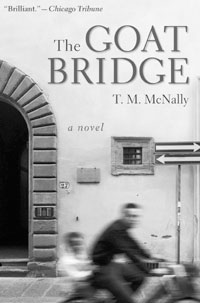| ||
Crossing the ‘Bridge’
by Joe Foster The Goat Bridge by T.M McNally. University of Michigan Press 2005. 310 pages. I’ve said this before, but it was quite a while ago, so I feel free to repeat and paraphrase: There is something infinitely stark and beautiful about another person’s pain. I don’t mean this in a cruel or sadistic way. When you think about it, most of the great fiction out there is an exploration of pain and loss and how a character handles it. A novel without pain at its core is often frivolous and bland. Pain is the human condition. And Happy New Year to you, too. Luckily, though, almost all novels also show us growth and redemption. What is a novel without change? Change is also the human condition, and all change that results in growth is good, even if it seems to suck (But, you ask, how can something that seems to suck, not in fact suck?) This is an arguable assumption, obviously. In the case of T.M. McNally’s The Goat Bridge, the main character, Stephen Brings, would argue most vehemently with me on this point. In fact, he’d be justified in punching me smack in the mouth. Stephen lost his young son in Rome. Literally lost. They were in a crowded square. Stephen turned to watch a performer. He turned back to say something to his son. His son was gone. Just like that. Of course, Stephen and his wife looked long and hard and contacted anybody they could possibly contact, but at what point and after how long do you stop looking? Well, you never stop, of course. Never. You always catch glimpses, and as the years go by you see a boy, about the same age yours would be, and you wonder. The pain is overwhelming. Stephen and his wife don’t make it. She blames him, and he blames himself and resents her for the guilt. The story is about Stephen’s career. He was a well-known and respected photographer before the disappearance. Artistic stuff, mostly. Afterwards, after the searching and the destroying of each other, Stephen and his wife settle into a sustained but tender long-distance hatred. She has an affair that he knows about, but he doesn’t really care. He redefines his career and becomes a photojournalist, diving headlong into the violence of Sarajevo. In a place of battle and blood and privation, Stephen finds his home, or at least a place in which the countryside most closely resembles the state of his soul. He gets to know the people of Bosnia, as well as the other action-junkies that swarm on war zones like … lots of swarmy things. He meets some of the locals, both soldiers and civilians, all trying to stay alive in that space between the hammer and the anvil. It’s not pretty. Stephen seems to surround himself with people that have every reason to suffer more than him. His own pain is put into context. The real crash occurs when he discovers through the numerous horrors of war, that his pain is still just as real as theirs. It’s among the vultures that surround him that Stephen discovers, or is discovered by, not only the woman who will heal him, but the new expression of his art. She’s a tough German photojournalist, a thrill-seeker with a clear humanitarian objective and enough patience to allow Stephen to feel again. His art strays from photos of war and is redirected toward the people he meets. A woman standing nude in silhouette in a room recently opened by a bomb; a mohawked young solider, his rage evident in his face and the finger he shoves at the camera. With his slow movement through love and reawakening pain, Stephen discovers how to reveal the personality of a people besieged, and, of course, the personality of us all. A very beautiful and haunting book, The Goat Bridge is a serious and expertly woven exploration not at all intended for the faint hearted. An observation of a man in pain observing the pain of others through a lens, this book is a great example of a man staring too long into the abyss. I am now a fan of T.M. McNally, who has won the Michigan Literary Fiction Award, the Flannery O’Connor Award for Short Fiction and the William Faulkner-William Wisdom Gold Medal for The Goat Bridge, which means I ain’t alone in my fan club. •
|
In this week's issue...
- December 18, 2025
- Let it snow
Although ski areas across the West have taken a hit, there’s still hope
- December 18, 2025
- Look, but don't take
Lessons in pottery theft – and remorse – from SW Colorado
- December 11, 2025
- Big plans
Whole Foods, 270 apartments could be coming to Durango Mall parcel


